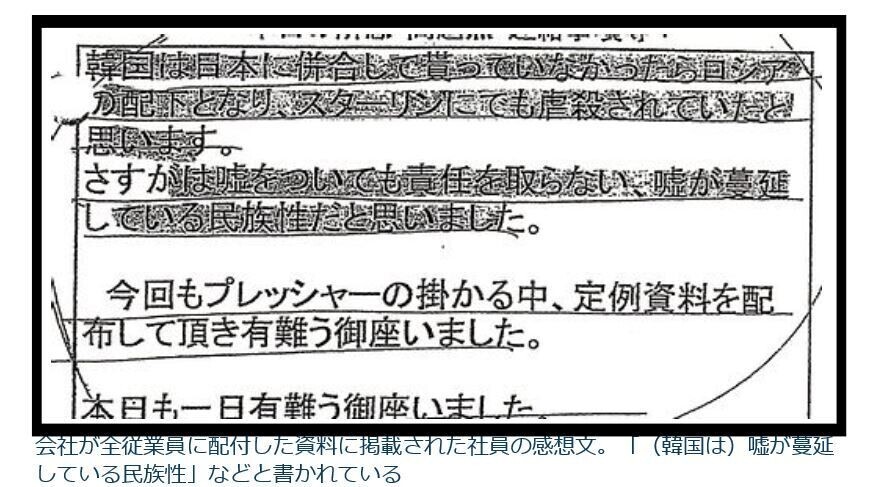hankyoreh
Links to other country sites 다른 나라 사이트 링크
Japanese court orders real estate company to pay compensation for circulating hate speech

The Japanese real estate company Fuji Corporation Limited has been ordered by a court to pay compensation for the persistent circulation of in-house documents containing hateful statements about Koreans, including descriptions of Koreans as having a “national character of pervasive lying” and saying that “Zainichi [ethnically Korean residents of Japan] should die.” But controversy continues to rage, with the company announcing that its plans to appeal and voicing fears about “serious constraints on freedom of thought” rather than apologizing to the victims or pledging to take action to prevent similar incidents from happening in the future.
On July 2, Osaka District Court ordered the Fuji Corporation and its chairperson Mitsuo Imai to pay 1.1 million yen (US$10,290) in compensation for the persistent circulation of documents containing hate speech against Koreans, which the court described as “beyond the pale of what is socially acceptable.”
The ruling comes five years after a suit was filed by a third-generation Zainichi Korean woman who works for the Fuji Corporation. The woman in question has used her Korean name rather than a Japanese one since the later grades of elementary school, and did not change her name of citizenship after marrying a Japanese man. In an interview with the Asahi Shimbun newspaper after her victory, the woman, who declined to reveal her name, said, “I continued to battle and refused to quit my job at the company because I want this to be a Japan where I can state openly that I am Zainichi.”
“I didn’t want to leave my children facing a future where they are cowed into silence by hatred and prejudice,” she added.
The Fuji Corporation is a company with over 950 employees and annual sales of 110.444 billion yen (US$1.03 billion). It was taken to court after circulating documents containing hate speech about Koreans to all employees over a two-and-a-half-year period from February 2013 to September 2015 and instructing the employees to submit responses. According to the Association to Support Trials for Hate and Harassment, which helped with the trial, the total volume of documents was enough to fill three boxes. The documents included everything from extreme comments stating that Zainichi Koreans “should die” to magazine and internet articles describing Koreans as “liars” and “wild animals.” Many also distorted historical facts, with one stating that Japanese military comfort women “lived in large two-story homes with rooms to themselves” and that their “living standard could be described as ‘luxurious.’”
The company also collected and redistributed responses written by employees after reading the documents, in which Koreans were described as having a “national character of pervasive lying and not taking responsibility for their lies.” The company was further reported to have forced employees to participate in a questionnaire in support of middle school textbooks that whitewashed Japan’s imperial history and wars of aggression in Asia.
In a recent statement, attorneys who assisted the plaintiff said, “We strongly urge the Fuji Corporation and Mr. Imai to take this judgment seriously and cease acts that threaten workers’ autonomy of character.”
But in a “company opinion in response to the judgment,” the Fuji Corporation announced its intent to appeal the ruling.
“Because of this ruling, companies will no longer be able to decide for themselves what they should not be circulating to their employees,” it said.
By Kim So-youn, staff reporter
Please direct comments or questions to [english@hani.co.kr]

Editorial・opinion
![[Column] Has Korea, too, crossed the Rubicon on China? [Column] Has Korea, too, crossed the Rubicon on China?](https://flexible.img.hani.co.kr/flexible/normal/500/300/imgdb/original/2024/0419/9317135153409185.jpg) [Column] Has Korea, too, crossed the Rubicon on China?
[Column] Has Korea, too, crossed the Rubicon on China?![[Correspondent’s column] In Japan’s alliance with US, echoes of its past alliances with UK [Correspondent’s column] In Japan’s alliance with US, echoes of its past alliances with UK](https://flexible.img.hani.co.kr/flexible/normal/500/300/imgdb/original/2024/0419/2317135166563519.jpg) [Correspondent’s column] In Japan’s alliance with US, echoes of its past alliances with UK
[Correspondent’s column] In Japan’s alliance with US, echoes of its past alliances with UK- [Editorial] Does Yoon think the Korean public is wrong?
- [Editorial] As it bolsters its alliance with US, Japan must be accountable for past
- [Guest essay] Amending the Constitution is Yoon’s key to leaving office in public’s good graces
- [Editorial] 10 years on, lessons of Sewol tragedy must never be forgotten
- [Column] A death blow to Korea’s prosecutor politics
- [Correspondent’s column] The US and the end of Japanese pacifism
- [Guest essay] How Korea turned its trainee doctors into monsters
- [Guest essay] As someone who helped forge Seoul-Moscow ties, their status today troubles me
Most viewed articles
- 1[Column] The clock is ticking for Korea’s first lady
- 2After 2 months of delayed, denied medical care, Koreans worry worst may be yet to come
- 3Hong Se-hwa, voice for tolerance whose memoir of exile touched a chord, dies at 76
- 4[Column] Has Korea, too, crossed the Rubicon on China?
- 5US overtakes China as Korea’s top export market, prompting trade sanction jitters
- 6Samsung barricades office as unionized workers strike for better conditions
- 7[Editorial] As it bolsters its alliance with US, Japan must be accountable for past
- 8[Correspondent’s column] In Japan’s alliance with US, echoes of its past alliances with UK
- 9All eyes on Xiaomi after it pulls off EV that Apple couldn’t
- 10[Correspondent’s column] The US and the end of Japanese pacifism